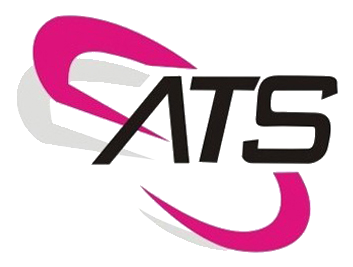SRCE> Electronics and Communication Engineering
Electronics and Communication Engineering
About the Department:
The Department of Electronics and Communication Engineering came into existence in the year 2000. The department has a UG (B.E.)programme in Electronics & Communication Engineering with an intake of 60 and a PG programme (M.E.) in VLSI Design offering high-class technical education to the students.
The students are also supported with Internship opportunities and Industry oriented projects during their eighth semester of study. Number of Clubs are functional in the department to express the Technical and Non-Technical skill of the student. Also, a career guidance cell is functioning in the department to give guidance on higher studies.
About the Program:
During the four years of Electronics and Communication Engineering, Students gain the knowledge of both the hardware and the software aspects. While they learn about Electronic circuits, Devices, and Communication Systems, they also learn about Embedded Systems, Programming languages and assembly languages. An Electronics and Communication Engineer, who has knowledge about the hardware field and also has a grip on some Computer languages, will be more successful during his career than other students who are proficient only in the Software Field. Hence, Electronics and Communication Engineers can switch from hardware to software field.
Program Scope:
On successful completion of the Electronics And Communication Engineering Degree programme, the Graduates shall exhibit the following:
Can Design, Develop and analyze Electronic systems through the Application of relevant Electronics, Mathematics and Engineering Principles
Can Design, Develop and analyze Communication Systems through the application of fundamentals from Communication Principles, Signal Processing, and RF System Design & Electromagnetics.
Can Adapt to emerging Electronics and Communication Technologies and develop innovative solutions for existing and newer problems
Career Scope:
- Students can have careers in industries like Consumer Electronics manufacturing organization, Automotive, Telecommunication & IT industries, Health care equipment manufacturing, Mobile communication (2G, 3G, and 4G), Internet Technologies, Power Electronics, and other industries like Steel, Petroleum, and Chemical Industry etc.
- ECE students also have lots of opportunities in Government and Private companies in the areas of Design, manufacturing, Installation, Operation, and maintenance of Electronic Equipment and Systems. New Opportunities and Avenues are also opening for Electronics & Communication Engineers due to the integration of Electronics into various new Industrial verticals.
Program Outcomes(POs)
Engineering knowledge: Apply the knowledge of mathematics, science, Engineering fundamentals, and an Engineering specialization to the solution of complex Engineering problems.
Problem analysis: Identify, formulate, review research literature, and analyse complex Engineering problems reaching substantiated conclusions using the first principles of Mathematics, Natural Sciences, and Engineering Sciences.
Design/development of solutions: Design solutions for complex Engineering problems and design system components or processes that meet the specified needs with appropriate consideration for public health and safety, cultural, societal and Environmental concerns.
Conduct investigations of complex problems: Use research-based knowledge and research methods including design of experiments, analysis and interpretation of data, and synthesis of the information to provide valid conclusions.
Modern tool usage: Create, select, and apply appropriate techniques, resources, and modern engineering and IT tools including prediction and modeling to complex Engineering activities with an understanding of the limitations.
The engineer and society: Apply reasoning informed by the contextual knowledge to assess societal, health, safety, legal and cultural issues and the consequent responsibilities relevant to the professional Engineering practice.
Environment and sustainability: Understand impact of the professional engineering solutions in societal and environmental contexts, and demonstrate the knowledge of, and need for sustainable development.
Ethics: Apply ethical principles and commit to professional ethics and responsibilities and norms of the Engineering practice.
Individual and team work: Function effectively as an individual, and as a member or leader in diverse teams, and in multidisciplinary settings.
Communication: Communicate effectively on complex engineering activities with the Engineering community and with society at large, such as, being able to comprehend and write effective reports and design documentation, make effective presentations, and give and receive clear instructions.
Project management and finance: Demonstrate knowledge and understanding of the Engineering and management principles and apply these to one’s own work, as a member and leader in a team, to manage projects and in multidisciplinary environments.
Life-long learning: Recognize the need for, and have the preparation and ability to engage in independent and life-long learning in the broadest context of technological change.
Program Educational Objectives (PEOs)
- To provide the Students with a strong foundation in the required sciences in order to pursue studies in Electronics and Communication Engineering.
- To gain Adequate Knowledge to become a good Professional in Electronic and Communication Engineering associated with Industries, Higher Education and Research.
- To develop an Attitude to Lifelong Learning, Applying and Adapting new ideas and Technologies as their Field Evolves.
- To prepare Students to critically analyze existing literature in an area of Specialization and Ethically develop innovative and Research-Oriented methodologies to solve the problems identified.
- To Inculcate in Students a Professional and Ethical Attitude and an ability to Visualize Engineering issues in a Broader Social Context.
Laboratory:
- Electronic Devices and Circuits Laboratory
- C Programming and Data Structures Laboratory
- Communication Systems Laboratory
- Linear Integrated Circuits Laboratory
- VLSI Laboratory
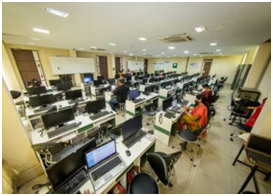
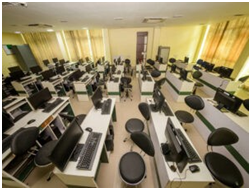
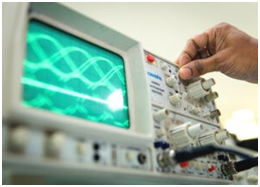
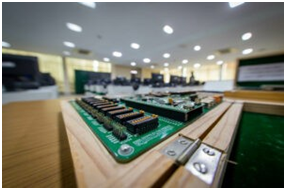
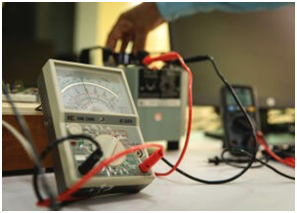
Faculty
A Team of committed Faculty members with Sound Knowledge in the areas of Applied Electronics, Communication Systems, VLSI, Embedded Systems, Computer Communication and Networking.
Placements
A Well-Networked Alumni member of the department offers technical guidance in technology exploration as well as in Placement. Department ensures the Placement opportunity for every deserving Student, the best Destination to choose Quality Technical Education in Communication Engineering.
Alumni
Our Alumni are paving the way for a Better Future. Graduates leave ECE with a top-tier education from one of the fastest-growing and most vigorous Engineering College.
As a part of the Electrical and Communication Engineering department, Students are prepared to gain Employment in top companies like INTEL, WIPRO and SAMSUNG, Across India and beyond.



